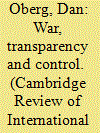| Srl | Item |
| 1 |
ID:
141195


|
|
|
|
|
| Summary/Abstract |
Against a surprising level of agreement between Clausewitz, contemporary military doctrines and critical war studies on an ontology of war as fighting, we suggest that the study of contemporary warfare needs to focus more on war as processing. Through Jean Baudrillard we argue that at least some of what is referred to as ‘war’ is no longer characterised by encounters through fighting. We exemplify our argument by how the repetitive battle-rhythm of military targeting strives for perfect war. What remains is not war as an object in itself, but a reified ‘war’ that obscures the disappearance of that very object. The debate on war contributes to the reification of such a war, as an imperative telling us: ‘we have a concept, you must learn to think through it’.
|
|
|
|
|
|
|
|
|
|
|
|
|
|
|
|
| 2 |
ID:
151322


|
|
|
|
|
| Summary/Abstract |
In contemporary research, transparency is commonly understood to indicate and guarantee openness, in ways that make it synonymous with positive characteristics of governing. However, the allegedly benevolent link between transparency and governing has also been questioned, giving rise to arguments that transparency enables violent social control. Drawing upon this latter view, the article stages an encounter between critical debates on transparency and critical accounts of war to examine the way that they come together in the operationalization of warfare. Engaging particularly with Jean Baudrillard’s writing on transparency, the article inquires into the way control is socially manufactured and administered through military doctrines. It concludes that the operationalization of warfare is not, as many tend to argue, first and foremost about a response to practical problems when conducting wars. Rather, it consists of the potential to unveil global space and global time as an attempt to maintain and control future political becoming.
|
|
|
|
|
|
|
|
|
|
|
|
|
|
|
|